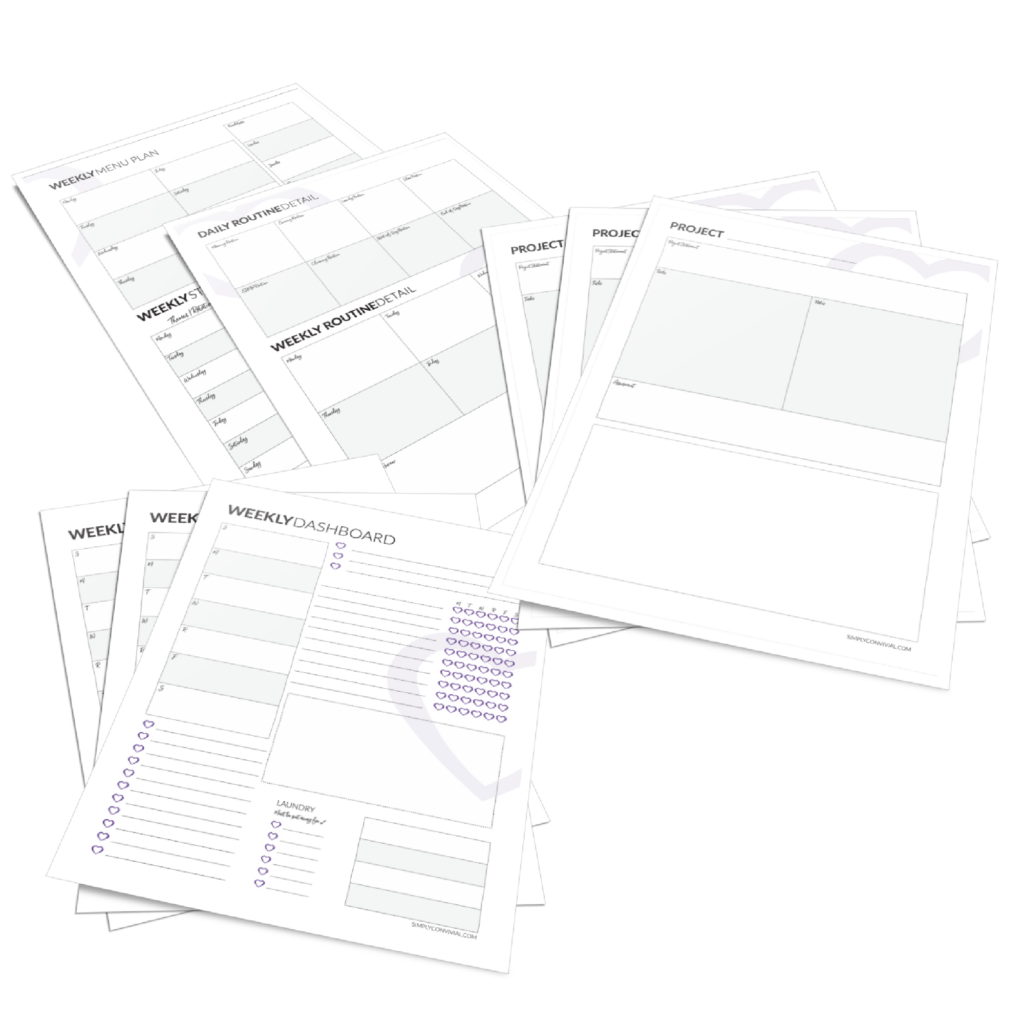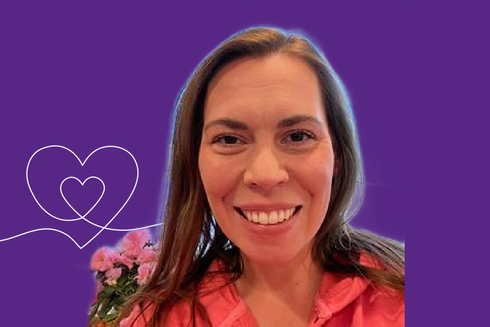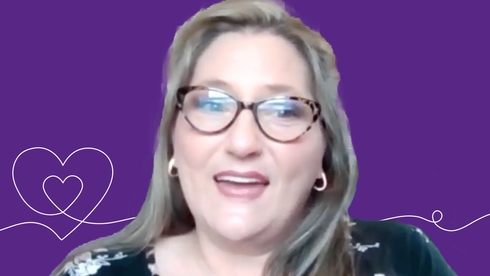
5 ENFP Organization Tips
By Betsy Farquhar: ENFP, homeschooling mother of three middle school students, and managing editor of Redeemed Reader.
How to Turn ENFP Possibility into Productivity
There are lovely pictures on Instagram of cheerful, color-coded planner pages, meticulously filled out; clever, completed habit trackers; and beautiful #BuJo spreads. Those people are not ENFPs.
ENFPs are busy instead managing relationships, enthusiastically brainstorming, and rising to the occasion (also known as “winging it”). “Friend” or “relationship-builder” are legitimate ENFP vocations.
Skills normally associated with productivity are our weaknesses: details, routine tasks, making decisions and actual plans, following through on those potential plans.
So sometimes, organization as an ENFP can feel impossible because we don’t fit the mold.
So both ENFP organization tips and productivity hacks are going to look very different from standard practices. However, that does not mean ENFPs cannot be both organized and productive – as long as we remember that both are about making it simpler to do the right next thing. ENFP organization might look different in practice, but in principle it remains the same.
If we think of ENFP productivity as a budget, then enthusiasm is the currency. Details and decisions are withdrawals. Relationships and ideas are deposits.
We become productive by balancing this budget.

TIME BUDGET TEMPLATE
Give every hour a name.
ENFP Organization Tip #1: Recognize and acknowledge the withdrawals
Organizational demands such as managing a new medical condition for a family member are “withdrawals” from my productivity enthusiasm budget. Other examples include:
- Executing tasks requiring multiple decisions, like decluttering
- Tracking household finances
- Managing chore charts or schedules
- Keeping up with extended family birthdays/anniversaries/events
- Planning and orchestrating a family trip
Recognizing these as withdrawals helps me appreciate their impact: even if I’m good at them or enjoying them temporarily, I can only handle so many at once. I start to feel like I’m drowning when I let details and decision-making crowd out meaningful relationship time or my initial enthusiasm trap me into monotonous, long-term commitments.
ENFP Organization Tip #2: Minimize the withdrawals
Those aforementioned “withdrawals” are good and necessary things. I’m not off the hook for them, but I can work smarter, not harder:
- Delegate tedious tasks.
Pay a house cleaner. Let my daughter organize the hall closet. Ask a friend for decluttering or decorating help. I’m still a responsible, resourceful homemaker ensuring tasks get done; now, I’m also a cheerful one!
- Automate routine decisions.
Examples include: basic cleaning tasks on certain days (“bathrooms on Wednesday”), regular grocery deliveries, automatic bill pay, Google calendar with reminders. Making a standard grocery list during Mystie’s Simplified Pantry Challenge was a game changer for me.
- Outsource decisions.
Let someone else plan the family trip details or even ask the waitress to recommend her favorite entrée. (Besides, then I get to talk to the waitress!)
- Be honest.
For example, let someone know: “I’d love to help you brainstorm or recruit volunteers, but I am not your detail person.”
- Wait before adding new commitments.
Reply with a “Let me get back to you” even if it sounds amazing. Taking time for prayer plus verbal processing with my husband and a close friend (or four) usually brings clarity to my initial enthusiasm.
- Act now for task victory.
In contrast, act now on sudden bursts of inspiration for moderate tasks like cleaning the stove. If the task could take a while (perhaps filing the last 6 months of papers from your kitchen command center… ahem), simply set a timer and leverage that enthusiasm! When the timer goes off, you’ve at least made progress.
- Leave margin.
If we overcommit and have no margin, then we aren’t able to do the very thing the Lord has gifted us to do: be available for other people relationally.
Those people that call me when depressed or in need of counseling? If I’m too busy and stressed, then I’m too busy to serve in the very way I serve best. This does not mean I’m at everyone’s beck and call. It does mean that I try not to pack my schedule too full, particularly with too many “withdrawal” tasks that leave me drained. I’m never bored or left with an empty day, no matter how much white space I have on that calendar at the beginning of the month.
ENFP Organization Tip #3: Make the right deposits
Close relationships, meaningful work that matters to those we love, and discussing ideas boost are direct enthusiasm deposits. Examples include:
- Small Group Discussion
Call it a Scholé Group, book club, study group, or whatever you want, but ENFPs benefit from some type of small group discussion related to things we value.
- Volunteering
As long as the job is a good fit, both in terms of skill set and available time, volunteering is a boost for ENFPs. For example, teach Sunday School, greet visitors, help people brainstorm ideas, recruit other volunteers (ENFP Kool-Aid, our skill set at its best). Fixing a meal or cleaning the church is a win if it’s alongside a friend.
- Relationships
Making time for relationships doesn’t look “productive,” but it’s essential. These are relationships that “give back,” not just the people who call us for counsel or encouragement. Call a friend instead of listening to a podcast during your daily walk. Meet your husband for lunch someday…without the kids.
ENFP Organization Tip #4: Turn possibilities into probabilities
Possibilities do not equal commitments. Tell other people your amazing ideas for the discussion groups you could have in that rundown house full of potential, and let them plan and execute the remodel. We ENFPs get ourselves in more trouble by assuming that we should act on all our fantastic ideas. We also get ourselves in trouble by failing to turn the right possibilities into probable productivity. Here are my strategies:
- Reduce organizational clutter.
Fancy planner pages and elaborate systems? Not going to happen. Give me a plain notebook with room to “think on paper” and Google calendar for everything else from “remember allowance $$” to “piano lesson.”
- Maintain a basic planning routine.
Weekly review: note commitments on Google calendar, list possible meals for my vague menu categories (i.e. “Crockpot” or “breakfast”), bring grocery list up to date, and start a running weekly brain dump/task list on a blank page.
Evening review: Evening fatigue curbs morning idealism. I pick ONE task to put on the next day’s to do list; I’ll tackle it first thing in the morning (or, as soon as possible the next day). Then, I star a few “top priorities” from the running task list for any other available time.
Morning review: I commit to a dinner plan and glance at the schedule. My starred “top priorities” are still in my head; I don’t really need to look at them again. I do the ONE selected task as soon as possible during the day before I get distracted.
Although ENFP organization might look different, the same structures still can work!
- Design flexible traditions.
Rather than committing to making homemade pizza every Friday, I just call it “pizza night.” “Pizza night” works because Mom gets to make whatever pizza she invents with what’s on hand, or order Papa John’s at the last minute, but it’s still pizza on pizza night. My fellow “P” hobbits are totally cool with variety; the “J” hobbits love that pizza happens on schedule.
Free Planner Templates
ENFP Organization Tip #5: Remember your strengths and your role.
ENFPs are social glue.
Use your relational intuition and overall cheerfulness to help your family members. Brainstorm solutions and ideas with those who struggle thinking outside the box. Help others express their feelings. Role play with those who have trouble picking up on social cues.
ENFPs might not be famous for achievements, but we will impact countless people, one person or small group at a time. Don’t let your planner determine your self worth. A detailed or crafty planner is not the same thing as productive and God-honoring.
Betsy’s recommended resources for ENFPs
- Mystie’s courses, especially the theoretical portions
- Boundaries by Cloud and Townend
- How to Manage Your Home Without Losing Your Mind by Dana White
- The Three Big Questions for a Frantic Family by Patrick Lencioni
- Crazy Busy by Kevin DeYoung.
Note: I must publicly thank my fellow ENFP, Megan, for helping me brainstorm and talk through this. ENFPs are never one-man bands!

Betsy Farquhar
Betsy fell in love with a handsome engineering student and the academic study of children’s literature at Covenant College. She married the one and pursued the other by earning a graduate degree in Children’s Literature from Hollins University and teaching middle and high school English in several Christian schools. She currently serves on World Magazine’s children’s books of the year committee and loves getting to read and review children’s books as the managing editor of Redeemed Reader. Betsy lives with her favorite engineer and their three children in the beautiful Northwest where they attend a small Orthodox Presbyterian Church, read a lot, and go hiking whenever they get a chance.





